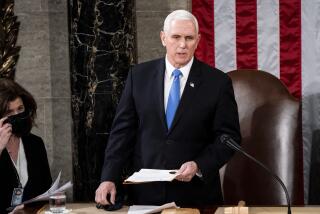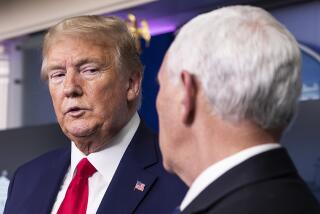Rice Stiffens Her Defense of President
WASHINGTON — President Bush’s national security advisor Wednesday stepped up her defense of the administration’s anti-terrorism efforts, calling two unusual news briefings in which she sought to discredit the president’s chief critic.
In sessions with television and print reporters, Condoleezza Rice accused former counterterrorism chief Richard Clarke of inconsistency in his allegations that Bush and top White House advisors did not heed his warnings about the danger of attacks or adopt his anti-terrorism plans as urgently as he advised.
Rice said that Clarke had claimed in his book to have presented the administration with an anti-terrorism plan, but that in his testimony had suggested it wasn’t a plan at all.
“Either he gave us a plan or he didn’t give us a plan. This story has so many twists and turns now that I think he needs to get his story straight,” Rice said.
Throughout the second day of testimony, members of the Sept. 11 commission increased their calls for Rice to testify under oath. She has talked for four hours to the commission members, but behind closed doors and not under oath.
In her briefings, Rice said she could not testify because it would violate the principle of executive privilege. “I would like to be very clear that this is not a matter of my preference. I would like nothing better, in a sense, than to be able to go up and do this,” Rice said. “But I have a responsibility to maintain what is a long-standing separation, constitutional separation, between the executive and legislative branch.”
The principle of executive privilege says that presidents have the right to keep staff information secret from Congress and other oversight. However, in the past, some presidents have waived that privilege to allow their national security advisors to testify: President Carter allowed Zbigniew Brzezinski to testify in 1980 before the Senate Judiciary Committee, and President Clinton twice allowed Samuel R. “Sandy” Berger to testify -- once in 1994 before the Senate Committee on Foreign Relations and again in 1997 before the Senate Committee on Governmental Affairs.
Rice argued Wednesday that those decisions to testify were unrelated to the current situation, since they involved allegations of wrongdoing.
“This is not that kind of case,” she said in a separate interview on NBC Nightly News. “It would set a bad precedent.”
Rice made it clear that she feels personally betrayed by Clarke, whom she kept on the National Security Council staff even though he was a holdover from the Clinton administration. In fact, he served as counterterrorism chief since 1992, when Rice worked on President George H.W. Bush’s national security staff.
Rice took the unusual step of releasing the text of an e-mail that Clarke had sent her in the wake of the Sept. 11 attacks, arguing that the administration had taken steps to prevent such an attack.
“The White House did insure that domestic law enforcement (including FAA) knew that the (Counter Terrorism Security Group) believed that a major Al Qaeda attack was coming and it could be in the U.S ... and did ask that special measures be taken,” the e-mail read. Rice said the message was dated Sept. 15, 2001.
In another unusual move, Rice took issue with comments from Vice President Dick Cheney, who said Monday that Clarke was “out of the loop” on the administration’s terrorism decisions.
“I would not use ‘out of the loop,’ ” she said. “He was in every meeting about terrorism. He was not in the president’s daily briefing.” She said it was wrong to suggest that Clarke’s job had been downgraded in the Bush administration, but that she had implemented a chain of command where Clarke didn’t report directly to the president, as had been the case under Clinton; he reported to Bush only through her.
“He was not demoted,” she insisted. “We had a different organizational structure.”
More to Read
Sign up for Essential California
The most important California stories and recommendations in your inbox every morning.
You may occasionally receive promotional content from the Los Angeles Times.










